冀教版八年级下册Unit 4 The Internet Connects Us Lesson 21 Books or Computers?课件(共34张PPT)
文档属性
| 名称 | 冀教版八年级下册Unit 4 The Internet Connects Us Lesson 21 Books or Computers?课件(共34张PPT) |
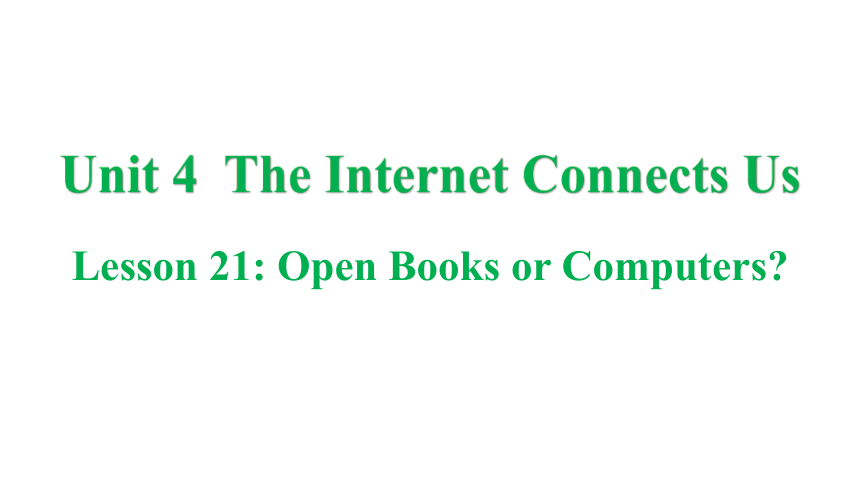
|
|
| 格式 | pptx | ||
| 文件大小 | 627.1KB | ||
| 资源类型 | 教案 | ||
| 版本资源 | 冀教版 | ||
| 科目 | 英语 | ||
| 更新时间 | 2024-05-02 18:04:54 | ||
图片预览

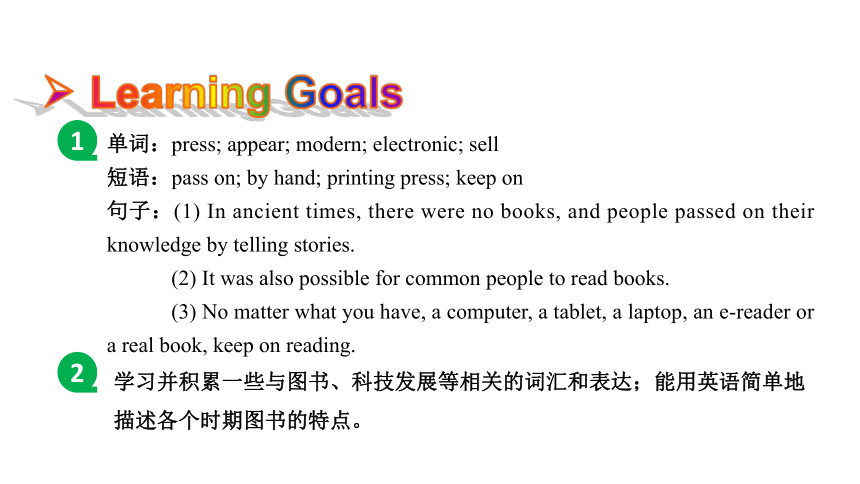
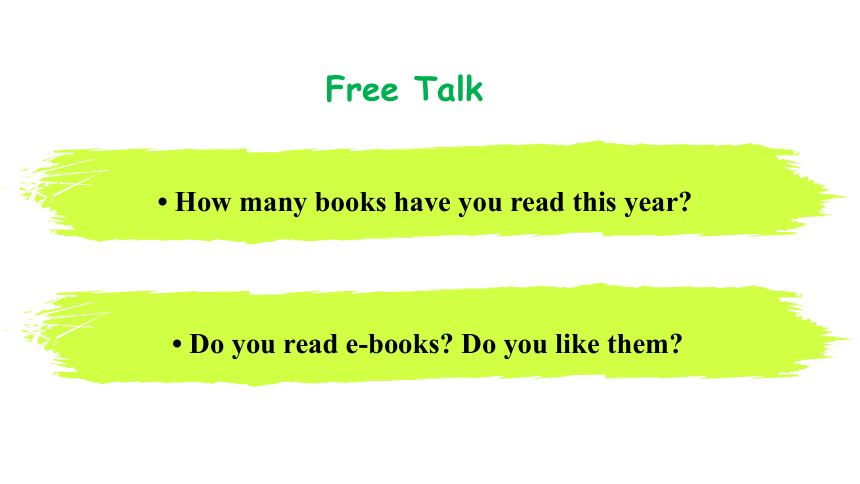
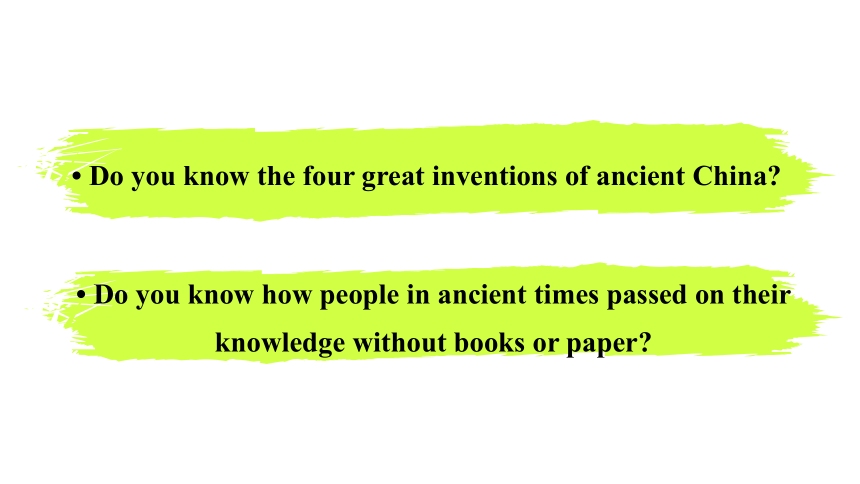
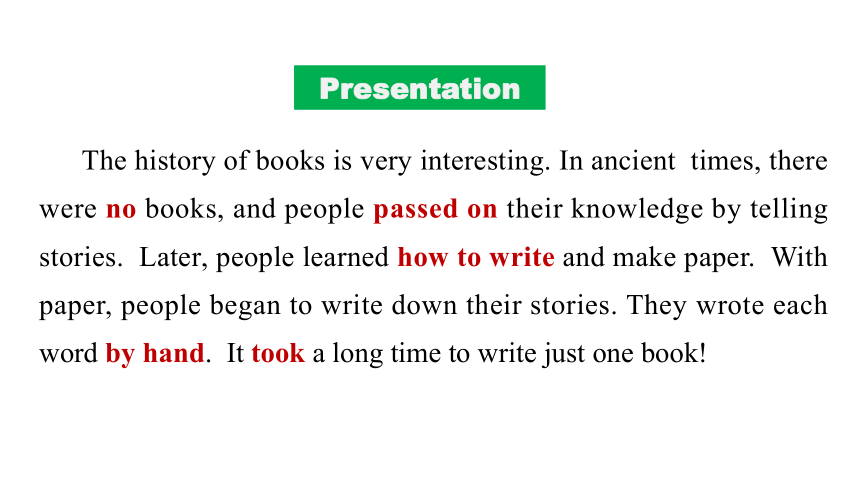
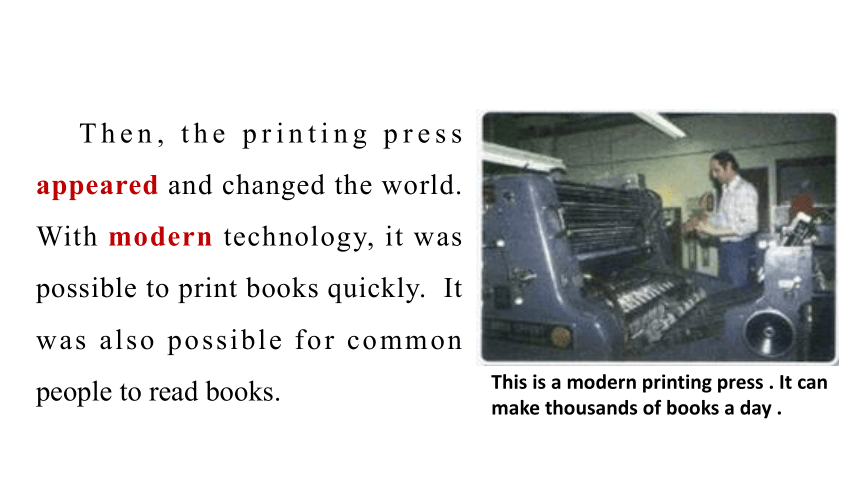
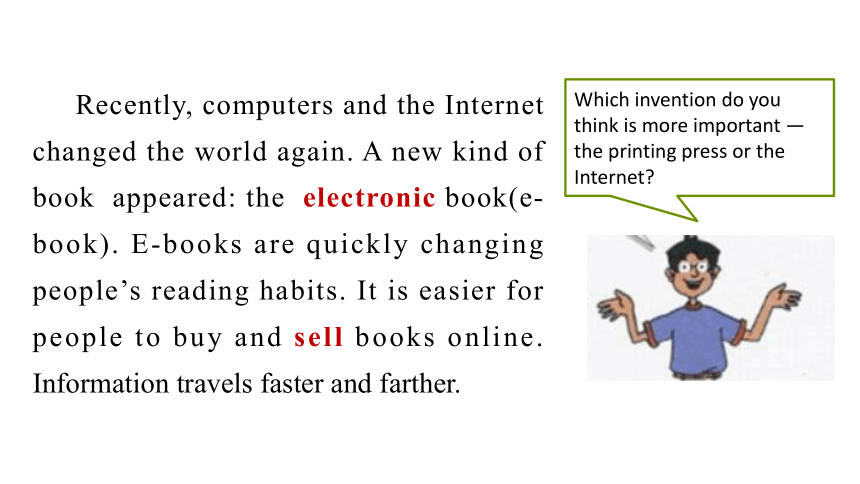
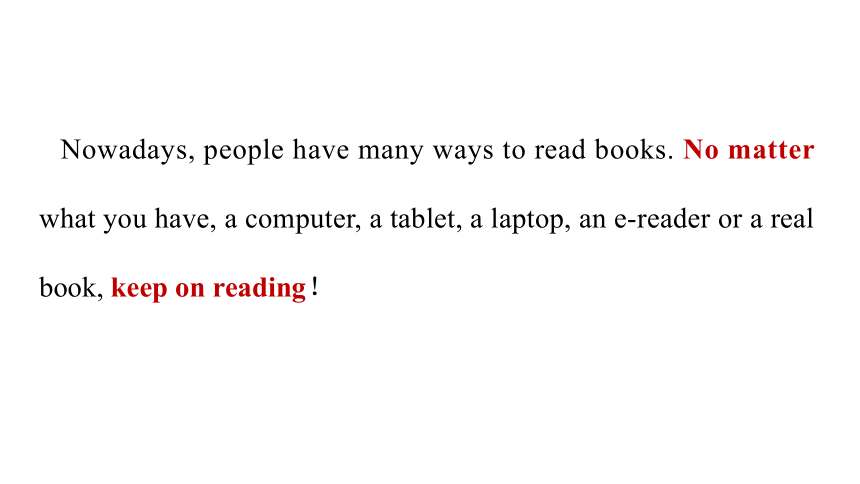

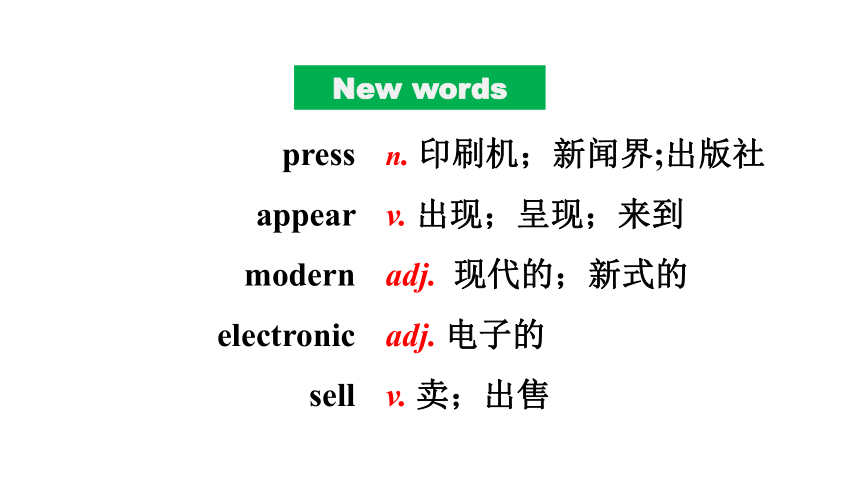
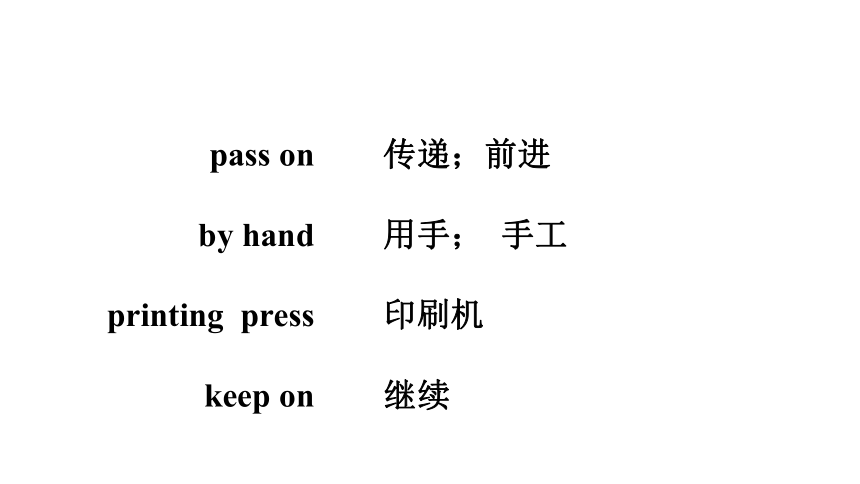
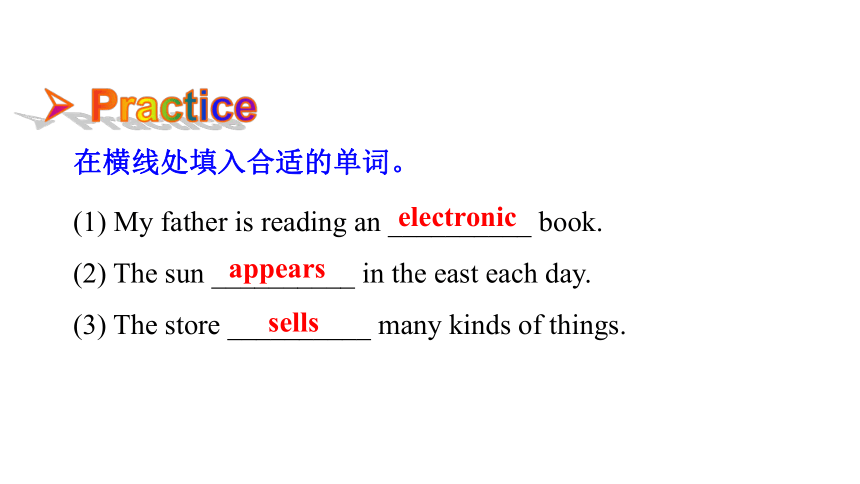
文档简介
(共34张PPT)
Lesson 21: Open Books or Computers
Unit 4 The Internet Connects Us
单词:press; appear; modern; electronic; sell
短语:pass on; by hand; printing press; keep on
句子:(1) In ancient times, there were no books, and people passed on their knowledge by telling stories.
(2) It was also possible for common people to read books.
(3) No matter what you have, a computer, a tablet, a laptop, an e-reader or a real book, keep on reading.
学习并积累一些与图书、科技发展等相关的词汇和表达;能用英语简单地描述各个时期图书的特点。
Learning Goals
1
2
Free Talk
How many books have you read this year
Do you read e-books Do you like them
Do you know the four great inventions of ancient China
Do you know how people in ancient times passed on their knowledge without books or paper
Presentation
The history of books is very interesting. In ancient times, there were no books, and people passed on their knowledge by telling stories. Later, people learned how to write and make paper. With paper, people began to write down their stories. They wrote each word by hand. It took a long time to write just one book!
Then, the printing press appeared and changed the world. With modern technology, it was possible to print books quickly. It was also possible for common people to read books.
This is a modern printing press . It can make thousands of books a day .
Recently, computers and the Internet changed the world again. A new kind of book appeared: the electronic book(e-book). E-books are quickly changing people’s reading habits. It is easier for people to buy and sell books online. Information travels faster and farther.
Which invention do you think is more important —the printing press or the Internet
Nowadays, people have many ways to read books. No matter what you have, a computer, a tablet, a laptop, an e-reader or a real book, keep on reading!
Culture Tip
Did you know that China was the first to invent paper Paper was invented during the Han Dynasty. Paper is
one of the four great inventions of ancient
China. The other three inventions are the
Compass, printing press and gunpowder.
Four
Great
Inventions
New words
press
appear
modern
electronic
sell
n. 印刷机;新闻界;出版社
v. 出现;呈现;来到
adj. 现代的;新式的
adj. 电子的
v. 卖;出售
pass on
by hand
printing press
keep on
传递;前进
用手; 手工
印刷机
继续
Practice
在横线处填入合适的单词。
(1) My father is reading an __________ book.
(2) The sun __________ in the east each day.
(3) The store __________ many kinds of things.
electronic
appears
sells
Read the lesson and answer the questions.
1. How did people pass on their knowledge without books in ancient times
By telling stories.
2. How did people write books in ancient times
They wrote each word by hand. It took a long time to write just one book.
Reading and Answering
3. What made it possible to print books quickly
The printing press.
4. What kind of books quickly changed people’s reading habits
The electronic books (e-books).
Let’s do it!
2. Read the lesson and put the sentences in the correct order.
The History of the Book
It took a long time to write just one book .
It made it possible for common people to read books .
The e-book appeared .
People had no books, and they shared knowledge by telling stories .
The printing press appeared .
People download books from the Internet .
With paper,people began to write down stories .
3
5
6
1
4
7
2
Let’s do it!
3. Fill in the blanks. The first letter is given.
Paper
With paper, people began to write down their stories. People wrote each word by hand. It took a long time to write one book. _____________ couldn’t travel far.
Printing press
When the printing press __________, it changed the world. The ________ printing press can print books quickly, and makes it possible for the _________ person to have easy access to books.
Information
appeared
modern
common
Internet
Computers and the Internet changed the world. They made it possible for a new kind of book: the ___________book. Traditionally books could only be bought and sold at a store, but today you can buy and _______ books online.
electronic
sell
Language points
1. In ancient times, there were no books, and people passed on their knowledge by telling stories.在远古时代没有书,人们通过讲故事传递知识。
(1) pass on意为“传送;前进”。
pass on the ball 传球
pass on knowledge 传递知识
辨析:pass 与past
① pass 动词:通过;走过;传递 I pass the supermarket on the way to work every day.
每天上班的路上,我都路过那家超市。
We all passed the exam.
我们都通过了考试。
② past 介词:在另一边;到另一侧 He hurried past them without stopping.
他匆匆走过他们身边,连停都没停。
(2) by介词,意为“通过”。
by doing sth.意为“通过做某事”。
※ My sister learns English by listening to English songs.
我姐姐通过听英文歌曲学习英语。
(3) no adj. 没有,无
句法分析:“no+可数名词复数/不可数名词”相当于“not any +可数名词复数/不可数名词”;“no+可数名词单数”相当于“not a / an +可数名词单数”。
特别提醒:当“no +名词”作主语时,谓语动词的单复数要与no后面的名词保持一致。
※ No news is good news.
没消息就是好消息。
※ No words are able to express my feelings.
我的感情是无法用言语表达的。
2. Later, people learned how to write and make paper.
how to write 怎样书写
特殊疑问词+动词不定式结构
在此结构中,疑问词可用疑问代词who、which、what等和疑问副词when、where、how等。
※ I want to know how to improve my spoken English.
我想知道怎样提高我的英语口语。
3. They wrote each word by hand.他们用手写下每一个字。
by hand是固定短语,意为“用手;手工”,表示方式。
※ My mother made the cake by hand.
我母亲自己动手做了这个蛋糕。
※ I like the beautiful sweater by hand.
我喜欢这件手工编织的漂亮毛衣。
4. It took a long time to write just one book! 仅写一本书就要花费很长时间!
“It takes (sb.) some time to do sth.”是固定句型,意为“(某人)花费多少时间做某事”。
※ It usually takes me about half an hour to practise playing the piano.
我每天大约花费半小时练习弹钢琴。
※ How long did it take you to get to Beijing by train yesterday
你昨天乘火车去北京用了多长时间?
辨析:cost, spend, take与pay
① cost 物+ cost(适当形式)+人+金钱 The ticket costs me ten dollars.
这张票花了我十美元。
② spend 人+spend(适当形式)+时间/金钱+ on +名词/ 代词 I spent all my pocket money on books. 我所有的零花钱都花在书上了。
③ take It + takes/took +人+时间+to do It took me an hour to walk there. 我花了一小时走到那里。
④ pay 人+ pay( 适当形式) +金钱+ for +物 He paid 5 dollars for that book. 他花了5 美元买那本书。
5. Then, the printing press appeared and changed the world.后来,印刷机出现并改变了世界。
appear不及物动词,意为“出现;呈现;来到”。
※ A bird suddenly appeared at the window.
一只鸟突然出现在窗口。
拓展:appear还可以作连系动词,意为“显得;看起来”,后面可接形容词作表语。
※ She appeared happy. 她显得很高兴。
6. It is easier for people to buy and sell books online.
sell v. 卖;出售(sold / sold)
常用短语:
sell well 卖得好;畅销(不用于被动句)
sell out/be sold out 售完
sell sb. sth.=sell sth. to sb. 把某物卖给某人
※ I want to sell the car.
我想卖掉这辆小汽车。
※ He sold the old car to me for 500 yuan. = He sold me the old car for 500 yuan.
他以五百元的价钱把那辆旧的小汽车卖给了我。
7. With modern technology, it was possible to print books quickly.通过现代科技,快速印刷图书成为可能。
“It +be +形容词(+for sb.)+ to do sth.”是固定句型,意为“(对于某人来说)做某事是……的”。it位于句首作形式主语,后面的动词不定式短语是句子真正的主语。
※ It’s important to protect animals in danger.
保护濒危动物很重要。
※ It’s not easy for my grandfather to learn to play the piano.
对于我祖父来说,学习弹钢琴并不容易。
8. No matter what you have, a computer, a tablet, a laptop, an e-reader or a real book, keep on reading! 无论你有什么,台式电脑、平板电脑、笔记本电脑、电子阅读器或一本真正的书,坚持读下去!
(1) no matter意为“无论;不管”,常与what, who, when, where等连用。
※ No matter what you do, be careful!
无论你做什么,要认真!
※ No matter who comes, don’t open the door.
无论谁来,都不要开门。
(2) keep (on) doing sth.意为“一直做某事;反复做某事”。
※ Keep (on) trying, and you will make progress.
不断努力,你就会取得进步。
1. pass on 传递
2. in ancient times 在远古时代
3. begin to do sth. 开始做某事
4. write down 写下;记下
5. by hand 手工
6. a kind of 一种
7. a way to do sth. 做某事的方法
8. no matter 无论
9. keep doing sth. 不断做某事
Work in Group
Practice
Ⅰ.用所给单词的适当形式填空。
1. Leave the building __________ (quick) when the ground stops shaking.
2. Our country is getting stronger and _________ (strong).
3. I’ve got a new camera, but I don’t know how _________ (use) it.
4. Let me tell you some good ways ___________ (learn) English.
5. The teacher keeps ________ (tell) his students the importance of hard work.
6. It will take us two hours ________ (get) there by bus.
quickly
stronger
to use
to learn
telling
to get
Ⅱ.连词成句。
1. the, no, there, library, in, were, books, paper
________________________________________________.
2. Internet, the, with, faster, information, travels, faster, and
_________________________________________________.
3. takes, it, homework, hour, to, my, me, about, an, do
_________________________________________________.
4. by, do, to, know, you, a, hand, book, how, make
__________________________________________________
5. e-books, interesting, it, to, is, read
__________________________________________________.
There were no paper books in the library
With the Internet, information travels faster and faster
It takes me about an hour to do my homework
Do you know how to make a book by hand
It is interesting to read e-books.
Sum up
1. The new words and expressions:
press; appear; modern; electronic; sell; pass on; by hand; printing press; keep on.
2. Important sentences:
(1) In ancient times, …
(2) Later, …
(3) Then…appeared and changed…
(4) Recently, …changed…again.
(5) Nowadays, …
Homework
1. Remember the new words and expressions learnt in this lesson.
2. Preview Lesson 22.
Lesson 21: Open Books or Computers
Unit 4 The Internet Connects Us
单词:press; appear; modern; electronic; sell
短语:pass on; by hand; printing press; keep on
句子:(1) In ancient times, there were no books, and people passed on their knowledge by telling stories.
(2) It was also possible for common people to read books.
(3) No matter what you have, a computer, a tablet, a laptop, an e-reader or a real book, keep on reading.
学习并积累一些与图书、科技发展等相关的词汇和表达;能用英语简单地描述各个时期图书的特点。
Learning Goals
1
2
Free Talk
How many books have you read this year
Do you read e-books Do you like them
Do you know the four great inventions of ancient China
Do you know how people in ancient times passed on their knowledge without books or paper
Presentation
The history of books is very interesting. In ancient times, there were no books, and people passed on their knowledge by telling stories. Later, people learned how to write and make paper. With paper, people began to write down their stories. They wrote each word by hand. It took a long time to write just one book!
Then, the printing press appeared and changed the world. With modern technology, it was possible to print books quickly. It was also possible for common people to read books.
This is a modern printing press . It can make thousands of books a day .
Recently, computers and the Internet changed the world again. A new kind of book appeared: the electronic book(e-book). E-books are quickly changing people’s reading habits. It is easier for people to buy and sell books online. Information travels faster and farther.
Which invention do you think is more important —the printing press or the Internet
Nowadays, people have many ways to read books. No matter what you have, a computer, a tablet, a laptop, an e-reader or a real book, keep on reading!
Culture Tip
Did you know that China was the first to invent paper Paper was invented during the Han Dynasty. Paper is
one of the four great inventions of ancient
China. The other three inventions are the
Compass, printing press and gunpowder.
Four
Great
Inventions
New words
press
appear
modern
electronic
sell
n. 印刷机;新闻界;出版社
v. 出现;呈现;来到
adj. 现代的;新式的
adj. 电子的
v. 卖;出售
pass on
by hand
printing press
keep on
传递;前进
用手; 手工
印刷机
继续
Practice
在横线处填入合适的单词。
(1) My father is reading an __________ book.
(2) The sun __________ in the east each day.
(3) The store __________ many kinds of things.
electronic
appears
sells
Read the lesson and answer the questions.
1. How did people pass on their knowledge without books in ancient times
By telling stories.
2. How did people write books in ancient times
They wrote each word by hand. It took a long time to write just one book.
Reading and Answering
3. What made it possible to print books quickly
The printing press.
4. What kind of books quickly changed people’s reading habits
The electronic books (e-books).
Let’s do it!
2. Read the lesson and put the sentences in the correct order.
The History of the Book
It took a long time to write just one book .
It made it possible for common people to read books .
The e-book appeared .
People had no books, and they shared knowledge by telling stories .
The printing press appeared .
People download books from the Internet .
With paper,people began to write down stories .
3
5
6
1
4
7
2
Let’s do it!
3. Fill in the blanks. The first letter is given.
Paper
With paper, people began to write down their stories. People wrote each word by hand. It took a long time to write one book. _____________ couldn’t travel far.
Printing press
When the printing press __________, it changed the world. The ________ printing press can print books quickly, and makes it possible for the _________ person to have easy access to books.
Information
appeared
modern
common
Internet
Computers and the Internet changed the world. They made it possible for a new kind of book: the ___________book. Traditionally books could only be bought and sold at a store, but today you can buy and _______ books online.
electronic
sell
Language points
1. In ancient times, there were no books, and people passed on their knowledge by telling stories.在远古时代没有书,人们通过讲故事传递知识。
(1) pass on意为“传送;前进”。
pass on the ball 传球
pass on knowledge 传递知识
辨析:pass 与past
① pass 动词:通过;走过;传递 I pass the supermarket on the way to work every day.
每天上班的路上,我都路过那家超市。
We all passed the exam.
我们都通过了考试。
② past 介词:在另一边;到另一侧 He hurried past them without stopping.
他匆匆走过他们身边,连停都没停。
(2) by介词,意为“通过”。
by doing sth.意为“通过做某事”。
※ My sister learns English by listening to English songs.
我姐姐通过听英文歌曲学习英语。
(3) no adj. 没有,无
句法分析:“no+可数名词复数/不可数名词”相当于“not any +可数名词复数/不可数名词”;“no+可数名词单数”相当于“not a / an +可数名词单数”。
特别提醒:当“no +名词”作主语时,谓语动词的单复数要与no后面的名词保持一致。
※ No news is good news.
没消息就是好消息。
※ No words are able to express my feelings.
我的感情是无法用言语表达的。
2. Later, people learned how to write and make paper.
how to write 怎样书写
特殊疑问词+动词不定式结构
在此结构中,疑问词可用疑问代词who、which、what等和疑问副词when、where、how等。
※ I want to know how to improve my spoken English.
我想知道怎样提高我的英语口语。
3. They wrote each word by hand.他们用手写下每一个字。
by hand是固定短语,意为“用手;手工”,表示方式。
※ My mother made the cake by hand.
我母亲自己动手做了这个蛋糕。
※ I like the beautiful sweater by hand.
我喜欢这件手工编织的漂亮毛衣。
4. It took a long time to write just one book! 仅写一本书就要花费很长时间!
“It takes (sb.) some time to do sth.”是固定句型,意为“(某人)花费多少时间做某事”。
※ It usually takes me about half an hour to practise playing the piano.
我每天大约花费半小时练习弹钢琴。
※ How long did it take you to get to Beijing by train yesterday
你昨天乘火车去北京用了多长时间?
辨析:cost, spend, take与pay
① cost 物+ cost(适当形式)+人+金钱 The ticket costs me ten dollars.
这张票花了我十美元。
② spend 人+spend(适当形式)+时间/金钱+ on +名词/ 代词 I spent all my pocket money on books. 我所有的零花钱都花在书上了。
③ take It + takes/took +人+时间+to do It took me an hour to walk there. 我花了一小时走到那里。
④ pay 人+ pay( 适当形式) +金钱+ for +物 He paid 5 dollars for that book. 他花了5 美元买那本书。
5. Then, the printing press appeared and changed the world.后来,印刷机出现并改变了世界。
appear不及物动词,意为“出现;呈现;来到”。
※ A bird suddenly appeared at the window.
一只鸟突然出现在窗口。
拓展:appear还可以作连系动词,意为“显得;看起来”,后面可接形容词作表语。
※ She appeared happy. 她显得很高兴。
6. It is easier for people to buy and sell books online.
sell v. 卖;出售(sold / sold)
常用短语:
sell well 卖得好;畅销(不用于被动句)
sell out/be sold out 售完
sell sb. sth.=sell sth. to sb. 把某物卖给某人
※ I want to sell the car.
我想卖掉这辆小汽车。
※ He sold the old car to me for 500 yuan. = He sold me the old car for 500 yuan.
他以五百元的价钱把那辆旧的小汽车卖给了我。
7. With modern technology, it was possible to print books quickly.通过现代科技,快速印刷图书成为可能。
“It +be +形容词(+for sb.)+ to do sth.”是固定句型,意为“(对于某人来说)做某事是……的”。it位于句首作形式主语,后面的动词不定式短语是句子真正的主语。
※ It’s important to protect animals in danger.
保护濒危动物很重要。
※ It’s not easy for my grandfather to learn to play the piano.
对于我祖父来说,学习弹钢琴并不容易。
8. No matter what you have, a computer, a tablet, a laptop, an e-reader or a real book, keep on reading! 无论你有什么,台式电脑、平板电脑、笔记本电脑、电子阅读器或一本真正的书,坚持读下去!
(1) no matter意为“无论;不管”,常与what, who, when, where等连用。
※ No matter what you do, be careful!
无论你做什么,要认真!
※ No matter who comes, don’t open the door.
无论谁来,都不要开门。
(2) keep (on) doing sth.意为“一直做某事;反复做某事”。
※ Keep (on) trying, and you will make progress.
不断努力,你就会取得进步。
1. pass on 传递
2. in ancient times 在远古时代
3. begin to do sth. 开始做某事
4. write down 写下;记下
5. by hand 手工
6. a kind of 一种
7. a way to do sth. 做某事的方法
8. no matter 无论
9. keep doing sth. 不断做某事
Work in Group
Practice
Ⅰ.用所给单词的适当形式填空。
1. Leave the building __________ (quick) when the ground stops shaking.
2. Our country is getting stronger and _________ (strong).
3. I’ve got a new camera, but I don’t know how _________ (use) it.
4. Let me tell you some good ways ___________ (learn) English.
5. The teacher keeps ________ (tell) his students the importance of hard work.
6. It will take us two hours ________ (get) there by bus.
quickly
stronger
to use
to learn
telling
to get
Ⅱ.连词成句。
1. the, no, there, library, in, were, books, paper
________________________________________________.
2. Internet, the, with, faster, information, travels, faster, and
_________________________________________________.
3. takes, it, homework, hour, to, my, me, about, an, do
_________________________________________________.
4. by, do, to, know, you, a, hand, book, how, make
__________________________________________________
5. e-books, interesting, it, to, is, read
__________________________________________________.
There were no paper books in the library
With the Internet, information travels faster and faster
It takes me about an hour to do my homework
Do you know how to make a book by hand
It is interesting to read e-books.
Sum up
1. The new words and expressions:
press; appear; modern; electronic; sell; pass on; by hand; printing press; keep on.
2. Important sentences:
(1) In ancient times, …
(2) Later, …
(3) Then…appeared and changed…
(4) Recently, …changed…again.
(5) Nowadays, …
Homework
1. Remember the new words and expressions learnt in this lesson.
2. Preview Lesson 22.
同课章节目录
- Unit 1 Spring Is Coming
- Lesson 1 How's the weather?
- Lesson 2 It's Getting Warmer!
- Lesson 3 Sun Is Rising
- Lesson 4 The Spring City
- Lesson 5 Babysitting on a Spring Day
- Lesson 6 Stories about Spring
- Unit 2 Plant a Plant
- Lesson 7 Planting Trees
- Lesson 8 Why Are Plants Important?
- Lesson 9 Gardening with Mary
- Lesson 10 Make Your Garden Grow!
- Lesson 11 Amazing Plants
- Lesson 12 Danny's Plant
- Unit 3 Animals Are Our Friends
- Lesson 13 Danny's Big Scare
- Lesson 14 Amazing Animals
- Lesson 15 The Zoo Is Open
- Lesson 16 The Pear Escaped
- Lesson 17 Save the Tigers
- Lesson 18 Friendship Between Animals
- Unit 4 The Internet Connects Us
- Lesson 19 How Do You Use the Internet?
- Lesson 20 A Computer Helps!
- Lesson 21 Books or Computers?
- Lesson 22 Travel on the Internet
- Lesson 23 The Internet--Good or Bad?
- Lesson 24 An E-mail to Grandpa
- Unit 5 Buying and Selling
- Lesson 25 Raising Money
- Lesson 26 Cookies, Please!
- Lesson 27 Business English
- Lesson 28 Ms. Liu's Great Idea
- Lesson 29 How to Push a Product
- Lesson 30 A Cookie Sale
- Unit 6 Be a Champion!
- Lesson 31 Don't Fall, Danny
- Lesson 32 My Favourite Record
- Lesson 33 2800 Years of Sports
- Lesson 34 Modern Olympics
- Lesson 35 The Dream Team
- Lesson 36 Classroom Olympics
- Unit 7 Know Our World
- Lesson 37 Let's Learn Geography!
- Lesson 38 The World Is a Big Place
- Lesson 39 Ring Up or Call?
- Lesson 40 Body Language
- Lesson 41 A Class of the World
- Lesson 42 North America
- Unit 8 Save Our World
- Lesson 43 Let's Clean Up!
- Lesson 44 Environment Clubs
- Lesson 45 Let's Sort Garbage!
- Lesson 46 Protect Our Environment
- Lesson 47 Connected to Nature
- Lesson 48 Garbage Is Interesting!
